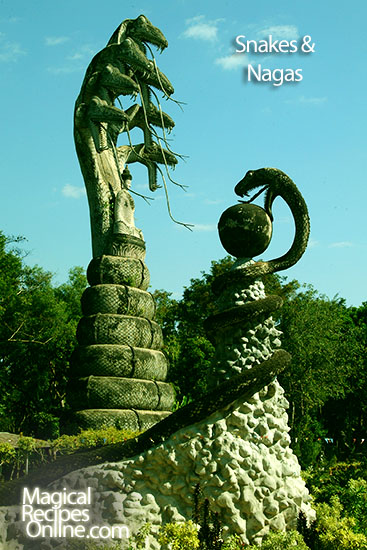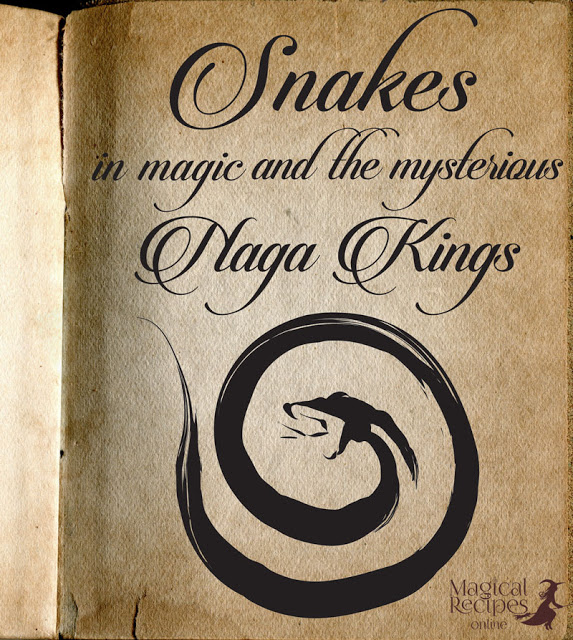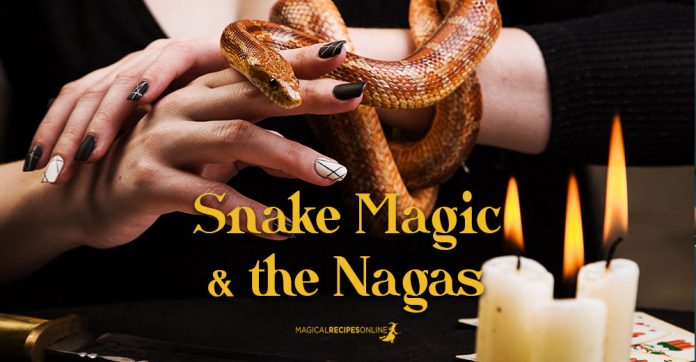Maybe one of the most mesmerising beings of nature for the human mind is the snake. From the ancient times until nowadays they seduce and terrify the humans and have become symbols of great good and great evil, Gods and Demons.
Snake Magic & the Naga
In Hinduism there are two great divine snakes (naga), two great Naga Kings, Lord Shisa (Shesa, Sheesa, Shisha, Shesha) and Lord Vasuki. Lord Shisa is the multi-headed cobra on who Great Lord Vishnu rests, and Lord Vasuki is the one who rests around the neck of Great Lord Siva.
Lore of the Naga
As about how these two Naga Kings came to exist and how great Gods they are it is a subject of discussion and controversy, but the divinity and the pure nature of these snakes is not.
The Bagavata Purana calls Lord Shisa as Ananta or Ananta Shisa, meaning Eternal or Eternal Shisa as Shisa has never started existing and will never cease to exist. Instead, according to the Bagavata Purana, Shisa is in fact an incarnation (Avatar) of the Supreme God. Now, this can be any one of the Trimurti (Great Lord Brahma, Great Lord Vishnu, Great Lord Siva). The first time that this is mentioned in the 5th Canto of the Purana it is not clear. Only later (Cantho 5 and 10) the Purana connects Shisa with all three Gods in a way that Shisa can be a form or a son of Brahma, the original form or an Avatar of Vishnu, the original form or an Avatar of Siva (Rudra).
Now, the Purana describes Shisa as thousand-headed one, but the most common appearance of Shisa is the five headed. In both cases his body is enormously big.
Also, Lord Shisa is ruler of the Ego expressed both as pride and as self-identification. Shisa will destroy the world in the end of this Time and will give birth to it again at the beginning of the next Time (in the form of one of the eleven Rudras – who are manifestations of the Great Lord Siva Rudra). As that is personification of the Time itself. He is also the source of all supernatural and superfine qualities that are.

In some cases Lord Vasuki is a brother of Lord Shisa. He also has a thousand heads but he most usually appears as one-headed, and he also is a Naga King. As said previously, he usually appears to rest around the neck of Great Lord Siva, and he maybe is the snake that rests around the neck or the belly of Lord Ganesha (who can be son or incarnation of Siva).
Lord Vasuki usually appears in the story of Samutra Manthan (which I will mention in the post regarding the planets Rahu and Ketu) in both Ramayana and Mahabharata. According to Mahabharata Lord Shisa and Lord Vasuki are the first and second sons of Lady Kardu, one of the wives of Lord Kasyap (who is also father of Lord Surya and the Sun Gods from his wife Adity, father of the Asuras from his wife Dity, father of Lord Aruna and Lord Garunda from his wife Vinata, and father of all the snakes from his wife Kardu).
Lord Vasuki’s poison is both beneficial and catastrophic. In the first book of Mahabharata it is said that from the poison of Vasuki a refreshing rain fall upon the Deva and the Asura.
Lord Vasuki symbolises protection, forgiveness and salvation. He is well worshiped in India and he protects some villages. He even has his own priests.
In Buddhism, Lord Vasuki (and some other Naga Kings) protects the Buddha and in some cases other enlightened beings. And his protective kindness appears also in other countries such as China and Japan.
In Hinduism Shisa resides in the skies and under Earth, and Vasuki resides in the spiritual waters (the Kingdom of Lord Varuna) and under Earth, connecting the divine snake with the nature, subconscious, the psychic powers and the spiritual powers.
Who is the Kundalini?
Another snake-like being in Hinduism is Goddess Kundalini who appears in the form of a fiery snake and symbolises the sexual energy. Lady Kundalini resides in the genitals of all living beings. Also it is worth saying that some of the mantras of Kundalini are used to change bad luck into a good one.

On the other hand, the most of the rest of the sons and daughters of Lady Kardu are evil in nature, and they are symbols of all evilness, and the lack of divine spirituality. They represent the evil magic and the evil beings. This is why the mantras of their enemy, Lord Garunda, not only protect people from snakes and skake’s poison, but also protect from black magic and heal the effects of such magic.
Snake Magic in Ancient Greece
In ancient Greece the snake is symbol of spirituality and health. And that is why the snakes appear on the sceptre o God Asclepius and on the Kerykeion of Hermes. Ouroboros, the snake that eats its tale represents the endless time.
Snake and the Bible
In the Old Testament the snake appears at first as a symbol or a form of Satan that allures Eva to eat the forbidden fruit. Later on, Moses will use the image of a snake on the top of his wand to protect his people.
Even later on St Peter will see a vision of snakes, worms and the likes and will be asked to take something of these and eat. He will refuse to do so saying that they are disgusting. But the voice (the God) will question his judgment saying “Who are you to call any of my creations disgusting?” relieving the snakes of their absolute evil symbolism in the eyes of the Christians (in this vision the snakes, worms etc are supposed to be St Paul).
So the symbol of the snake and therefore the use of the snake as a Totem can be for many causes such as
*To connect with Earth and Nature
*To protect yourself from snakes
*To protect yourself from black magic
*To protect yourself from any evil
*To promote healing and to empower healing powers
*To enhance your sexuality
*To enhance your energy levels
*To turn evil into blessing
*To improve your spirituality
*To improve your spiritual and psychic powers
*To achieve everlasting youth (the form of immortality that the snakes achieved, as we will see in the post regarding Lord Garunda)
*To promote forgiveness
*To achieve salvation and liberation of any and every kind
Have fun and be blessed!
Discover, Play, Love!

